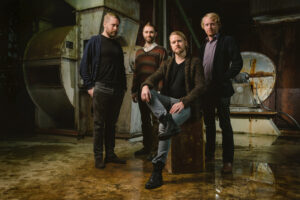
Árstíðir (English: ‘Seasons,’ website here) is an independent band based out of Reykjavík, Iceland. Their music includes ochestral elements, folk, rock, classical, and are uniquely heavy on vocal talent and lyrical complexity (due to the fact that all of their members sing). Their music often contain motifs that are darker than their incredibly touching melodies and perfect harmonies let on. They have just released their third studio album, Hvel (English: ‘Spheres’).
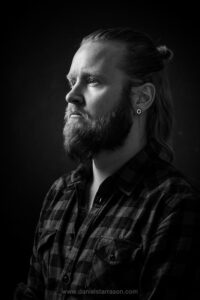
Today, I had the opportunity to sit down with Ragnar Ólaffson at Tíu Dropar, one of his favorite cafés in downtown Reykjavík, for an interview about their newest album, their recent experiences touring, and plans for their upcoming tour.
(Apologies for the audio quality, transcript below).
So you guys were just on tour. And you´re actually touring again here in a few weeks, right?
Yeah. We just came back from our second tour this year. It was a short Scandinavian tour to unusual places.
Svalbard?
Svalbard, yeah. It was cold.
Did you see any polar bears?
Well, it was dark. By the time we were there it was still dark. The sun hadn´t reached that part of the world yet, because they had the polar night, three months. But also due to the fact that polar bears are shy. That´s a good thing. If you see a polar bear, it usually means he´s hungry or hostile.
Did you go with guns?
We didn´t travel alone outside the town so we didn´t have to. But I lived there myself. It was cool.
How long did you live there?
Fifteen months.
That´s a long time to live in Svalbard.
I came back two summers after that, and so that´s a connection to how we were booked in this festival because people there knew about the band.
So you just booked a tour in the US also! How did that happen?
I´ll tell you exactly how it happened. We didn´t have any following that we knew about in the States, and no sort of means of touring there, so we did the Kickstarter thing last year. So we did the Kickstarter thing, and since Kickstarter is an American community, we had so many backers, new backers, discovering us through the campaign so we ended up with, I don´t know, 1,500 backers.
Yeah, I saw! And you actually made over three times as much as what you were asking. How did that feel.
Well, good. But that also meant we had to manufacture three times as much T-shirts and CDs and all that stuff.
So how´s that going?
Uh, we´re getting there. Almost finished. But so, that´s how we found out we had people in the States going for us and in the wake of that, we got an email from an agent in Oregon who wanted to book us.
Did you get to choose the cities or did the agent do it for you?
She just did it for us. She basically throws out a net of questions, festivals, and stuff, and says this Icelandic band is coming over, do you want to have them at your place? And she gathers all the offers and makes a tour that makes sense. A coherent tour, because you can´t just drive zigzag. So we´re doing New York down to Washington, Toronto, and then sort of work our way [west] to Seattle, down the coast to L.A. over to Phoenix in sort of a circle.
And you have a concert in St. Louis too, which is where I´m from! So where you got a lot of your base from, was it from ‘Heyr, himnasmiður?’ (This was a video that went viral of the band singing an old Icelandic song, ‘Heyr, himnasmiður’ [Hear, Heavensmith] in a bus station in Germany).
Yeah, it sort of helped. And that went viral at the same time we started the campaign. I think the campaign sort of helped out. People were talking about Árstiðir and sharing our sites and saying ‘Check this out!’ and then that triggered the success with our Kickstarter. And it´s sort of interesting when you get to experience the viral thing, but it´s really helpful to get people to look your way.
And so you were recording in Toppstöðin, which is an abandoned Power Plant in Reykjavík. Do you think that you´re going to go back, or are you kind of done being there, and what was recording there like?
Very cool. We actually wrote the whole thing there, recorded some demos, and did some of the major recordings in Toppstöðin. And for me personally, it feels like that it, a little bit. It´s like when we went in there we needed a new context for new music for our band. We needed new ideas, and that provided the perfect space for it, and for thinking in a different way.
This album does sound different than the other ones. It´s actually got a different theme for the album art. Why was the album art previously, it was all bird/crow related, and now it´s…?
Yeah, well the first one is the name of the bird. It´s an Icelandic bird, on the first cover, and you see like a closeup of the feathers and that´s one of the birds that stays and changes colors, so it´s like a metaphor for the seasons. And the second time the artist that we were working with, she just had our music and it put images in her mind of birds. And that was the artist´s choice, and she came up with these sketches and we were like, ‘Yeah, let´s run with it.’ And of course then came the remix, that was just a remix of the album so we kept the crow and did an electronic version of the crow. But yeah, after that we made two nature-related albums. Very acoustic, very downscale, there´s hardly any effects on the first album. It´s just the instruments we play all recorded at the same time but separately, so the listener is supposed to be in a little like, campfire. And the second album was also close to that. It´s like just a bare minimum, just the instruments we play ourselves. No separation between the lines on the album. But after doing two albums like that, we just needed to do something else. And it also happened that two members left the band. It wasn´t dramatic but we sort of thought we had to reinvent ourselves a little bit. So we needed new ideas, new context.
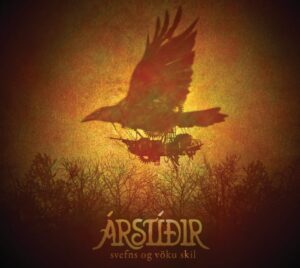
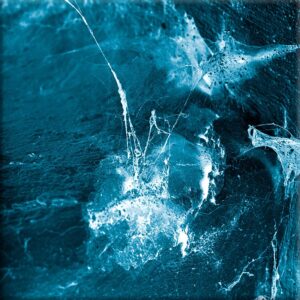
And it sounded like you started experimenting with electronic sounds.
Definitely. We just said, let´s just try it, let´s try whatever instruments we feel.
Do you collaborate with other bands, or just when you play? So for instance, I also listen to Rökkurró and the cellist is often playing for you guys when I see you guys playing acoustically.
Yeah, so we´re just four members now and don´t have a fixed cellist, so we hire a cellist for live shows and tours. So the blond girl, Unnur Jónsdóttir, she plays for a lot of bands. So we just hire different cellists depending on who is available at which time.
And what songs did you contribute to specifcally in terms of lyrics?
Me personally? I wrote the lyrics for Vetur að vori, Cannon, and Shine.
Which one of those are most personal to you? So the Icelandic songs, I was trying to translate them but I did a bad job. But it sounds like most of the songs are written to a specific person almost, or a very specific thing happened and then?
Yeah, that´s true. When we write a song, we have a person in mind. If you have a feeling you want to translate, you know, you think of someone or something and you use that. It could be an imaginary person sometimes or a mixture of different traits or different people mixed into one character to serve the making of the poetry. But my songs, it´s very specific which person.
It also seems like a lot of the events that may have taken place to inspire this album were kind of sad? Or, I mean, there´s maybe one or two happy songs on the album.
Which one do you find happy?
Well, maybe not happy, but Friðþæinging is about atonement and you have to pay the price for atoning for something, but it also says ‘Nýtt lífsins hér og nú.’ Enjoy life here and now.
It´s about saying goodbye to the needs of commercialism, and yeah. That´s a good point, I hadn´t actually thought about that. It´s the only song that sort of opens up that possibility, and offers a way out of the darkness. Whereas the other ones are pretty…
Nihilistic.
Yeah. Subject matters are darkness and… Some of them are very deep, some of them are sort of dramatic, some are not and less dramatic and just metaphoric. I guess Shine would be the darkest, if you want to uh… They´re two opposites of a whole. It´s written in the first person about a person saying goodbye to life using space as a metaphor.
And the other song you did lyrics for was…
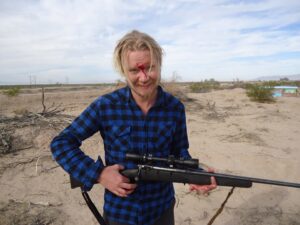
Oh, Cannon? It´s actually, well, there´s different layers. Like Cannon is actually a true story about when I was visiting actually the States a year ago, and I went to see a friend in New Mexico. He´s a real cowboy. And he wanted me to try his rifle and I did, and I had the rifle and the scope which hit me and now I´ve got the scar (pointing to his forehead). So I shot this rifle and I had the scope hit me. Nearly knocked me out, but I didn´t drop the rifle AND I hit the target. But I was bleeding like a pig, just like blood everywhere. It was actually the second round I fired. The first round I fired and I got the recoil which was so harsh and the second time I was more nervous, and that changed my posture a little bit and *smacking noise*. So that´s what triggered the lyric. But then of course once you have a melody and an idea, then you throw in a couple of other ingredients and you plant a lyric seed. So it´s also a love story.
And did other people contribute to that song as well, lyrically?
That was just me, but the music, that´s sort of the thing with this album. Sometimes it´s hard to tell who wrote which part. Usually the guy who sings the lead is the one who came up with the framework, but sometimes the framework can change beyond recognition.
Oh, and I read in another interview, something about maybe the band doesn´t quite get along in terms of what exactly to put into a song, and there can sometimes be a little bit of friction. Has that gotten better with this album, did you guys come together more smoothly?
Naturally when you have a small band there´s… it´s easier to be a four-piece democracy than a six-piece democracy. It´s just, you know, how it is. And it´s our seventh year as a band this year.
Congratulations!
Thanks. Yeah, this summer will be the seventh candle on our fictional cake, but we really get better with working together. Both musically and socially.
When you´re on tour, this is kind of on a different topic, do you stay with people you already know, do you have to book hotels the whole time? How does that happen?
Rarely we stay with people we know because there´s too much to do on tour. Basically you have a gig and you have to get to a new city every day and that can take from 3-8 hours driving, so there´s not much time for walking around and being a tourist or seeing friends. And actually, I even prefer if I don´t have the time to see friends and have a good evening with them I´d rather just get through the gig. We´ve been to around 30 countries now, but we don´t have friends everywhere so most of the time we´re going new places.
Some of the members of the band mentioned they wanted to arrange for a large orchestra. Have those plans gotten farther along, or do you know anything about that?
Well brother, we played with three symphonic orchestras last year.
One was with the Russian symphonic, right?
Yeah. One in Siberia, one in West Russia, and one in north Iceland. It´s not official yet, but talks are under way for the big guys. We have now arranged our music for symphonic orchestras. The work was making all those arrangements, writing for different players. Now we have have it and it´s going to be easy to throw a gig. So if there´s a symphonic orchestra in the States and there´s a music hall…
That would be awesome. And did that make it easier to do the sheet music for the Kickstarter campaign?
Yeah, it certainly helps. Because you can use some of the stuff you´re already done, you just take out maybe the bassoon.
And it´s been mentioned before that being just a band in Iceland is kind of difficult because there aren´t that many people in Iceland.
And there are so many bands!
Yeah, there´s so much talent coming out of Reykjavík and Iceland in general. So, does work and school ever get in the way of you touring? How do you balance work and being a band?
You said it. We balance as best as we can, but right now is a tipping point, so we´re reaching a point where we´re touring so much that we can´t hold jobs anymore. Not even part-time jobs. I´m already there, and then I guess we have to stop our half-time jobs. But if this goes well, down the road, eventually we take the leap and we can´t do that until we can have some money for the band. Until then we just have to find a way. I live at my mom and dad´s again, to save money on rent and stuff. I get by on very little, but that´s just something you have to do for a time while you´re getting ready for the band to break. That´s just part of the game.
So you wrote the lyrics for another song.
Yeah, Vetra að vori.
That´s actually my favorite song on the album.
Oh really?
Yeah! I love the lyrics, I love the sound of the song. And it also goes along with ´Árstíðir,´ about seasons, but you skip summer and autumn and go directly to winter from Spring.
That´s thing. It´s a play on words in one sence, because in Iceland sometimes we have Spring, and you´re like ‘Where´s the sun?’ and you have this weather that´s like winter. So the winter and the spring, that´s one of the ideas. It´s also referencing the chorus. ‘The spring says farewell to the winter, through the force of this change we´ll try to do better.’ So spring is giving you hope. By saying goodbye to the winter your urge to do better, but the very last sentence takes all hope away.
Oh yeah, how would you translate that last line? I have ‘Do not put your dream to death.’
Yeah, it´s like a Cinderella story. A guy is day dreaming and he keeps here here under this sort of beautiful veil of forgetfulness, and while he´s daydreaming, he can´t sleep. That´s when he visits her, but the last sentence, ‘að andvaka hugur minn deyð’ ekki drauminn þinn’ means I hope my insomniac mind will not disturb your beautiful dream. But ‘deyði’ also has a connotation of death. So ‘hope it does not kill your beautiful dream.’ And ‘Um stund hún megi hvíl í friði,’ may be rest in peace. So it´s very morbid. You know, hinting hope, but then taking all hope away, and just being very depressive. A story about lost love or a potentially lost love that never happened.
Actually I wasn´t sure how to translate this either: with the weapon of wisdom and hope?
Well the wisdom of the weapon. So say goodbye to winter, and when spring comes we´ll try to do better, and the weapon will be wisdom and hope. So you have two weapons, wisdom and hope, and we hope that my insomniac mind doesn´t fuck it up. And I would take from that song that it´s hard to say whether it´s a hopeful song or not. But if you scrutinize it…
Yeah, if you hear it at the surface it could be interpreted either and then when you…
Yeah, and it comes with a rise in the chorus. With the wisdom and hope comes a big rise in the notes, with the chorus rising, sort of fitting of something triumphant. And then the music abruptly drops out and just leaves a lone guitar, and that´s the space. The way I write music is kind of like poetry. You have sentences and space between the sentences, and that space affects the way you interpret the song. And you can use that space, so this particular song has many spaces where it just stops so it can come back. And the space is emphasizing certain things.
Writing in Icelandic is significantly different than writing in English. It´s more strict, yeah?
It can be. But you can have that experience writing in English as well. So it´s a choice– I guess the modern Iceland and Old Icelandic are closer than maybe Modern English and Shakespearean English so it´s easier to lend yourself to using older discourse. It´s something you can usually do for dramatic effect, sometimes for ironic effect, sometimes you just like the sound, the beautiful Icelandic words. And that´s why you choose them. The way I use it is obviously less than modern, and some words are used in a less conventional way. Like when I say rest in peace, ‘hvíl í friði,’ like it´s a shorter version of the word.
And why is the name of the album Hvel?
Well, it´s a very cool word. It sounds cool. And it doesn´t have any letters that can fuck iTunes up. It´s a simple word that, well, because the name of the band Árstíðir, so if people can find our band despite the strange name, we want to give them something easy. But then it´s pronounced ‘Kvel,’ like with a ´k,´ which is also tricky, but it´s sort of… ´kvel´means sphere. It can also mean something that´s convex, like if you see the curve of a mountain ridge, that could be the ‘hvel’ of the mountain. Or ‘Himinhvel’ (a name of a song on the album), it could mean sphere of the skies. So the word lends itself to many different meanings and as artists it´s our job not to tell you which one it is.
When you write these lyrics, are you thinking, ‘It´s gotta sound good when it´s on paper also,’ or does it only have to sound good in the song? Do you have to change your lyrics a lot?
I think the music writes the lyrics, but we take good care to have the written side of it also thought out. Have you seen the CD yet?
Yeah! Well I don´t have a physical copy yet because I just have it through iTunes.
So we crammed the lyrics there just for aesthetic purposes, so it´s beautiful to behold. But then on our band page, we offer lyrics for free where you can see how they´re actually written.
So you´ve already got one single out, there was the one in October, and then another video that came out.
The one of the glacier.
https://www.facebook.com/video.php?v=10154852223710296&video_source=pages_finch_trailer
Yep, which was very cool. Are there plans for more?
Yep! Right now we are starting to make a video that´s going to be a video that Kickstarter backers are the first to get access to. There´s one thing I can tell you about the tour in the States that´s very interesting. We´re doing a headline tour, and for that, to come to the States for the first time and headline is unheard of, especially in Iceland. Of Monsters and Men didn´t even do that the first time around. They were supporting bigger acts. But the way we can do it is because we are trying to save money on transportation and sleeping. So instead of renting cars and paying for hotels and all that, we just bought a school bus.
You bought a school bus?!
Yes, an American yellow school bus.
Wow!
And we´re very fortunate to have a friend in the states who is very handy. He likes to work and is converting it for us, making bunks in the back and a couple of couches. And by that, we´ll just live in that for six weeks, drive around, and that way we can not use so much money on transportation. And then that way our budget looks more like we´ll break even.
Are you excited about touring the US?
Of course!
Anything you plan to do there other than playing music? Or that you want to see?
Well we of course want to see as much as we can, but it´s going to be a very intense tour. Because we needed to get work permits, and they´re a bit expensive. So there´s a lot of starting costs to tour the States. So that way, when you´re in the States and you have your work permit already, you want to work as much as you can to sort of make money. And that´s why we have a tight tour. Very few days of other things. 10,000 American miles. In six weeks, it´s a lot of distance to drive.
I hope you enjoy the United States. It can be okay sometimes.
I´ve been there a couple times myself. Actually for six months I was in Colorado studying there. It was just part of high school so I studied some English. But then I couldn´t get the classes to transfer to my school so I had to take an extra semester in Sweden when I got back, which means I just had some fun classes in the States. It was a fun time.
To learn more about the band, visit their website here, their Facebook, listen to and purchase their their music here (their website) or here (iTunes).

One response to “Interview with Ragnar Ólafsson of Árstíðir”
[…] The violinist Karl James Pestka along with a cellist, who is unnamed due to Arstidir currently hiring a new one for live shows, were the backbone of the show and one of the reasons the music was so intense was […]